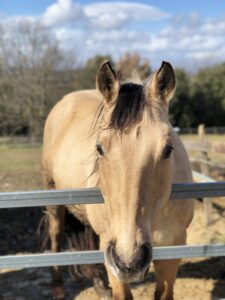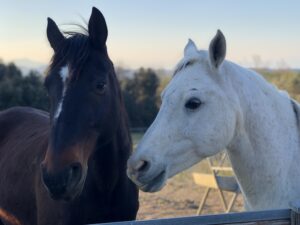Most of us don’t want to think about what will happen when our horses’ performing days are over. Deciding when to retire a special horse isn’t easy, particularly after years of successful partnership.
It’s difficult to know when the time is right or how to go about it, but with forethought, you can ease your senior horse into a retirement lifestyle that will keep him safe, healthy, and happy right through his golden years.
Down But Not Out
Retirement doesn’t mean your horse doesn’t need love, care and exercise in his later years. Not all horses are happy living out their lives as pasture ornaments, and ex-equine athletes that thrive on attention and high-paced environments will be especially miserable thrown out in a field and forgotten.
Your horse still needs to stay active to keep his muscles and bones strong, and to maintain a healthy body weight.
Go slowly with your horse though, and keep check of his daily condition. Start your rides easy and watch for any signs of fatigue, pain or unrest. As your horse’s caregiver, you always want ensure your horse doesn’t push himself too far. Older horses have more trouble regulating their body temperature, so it is a good idea to avoid exercising on hot or very cold days. Monitor your horse for signs of fatigue or overheating, and avoid getting him sweated up if you don’t have time to dry him off properly.
While you may want to avoid steep hills, and strenuous riding, steady rides over undulating terrain can be helpful to stimulate his postural muscles and diminish the burden on his joints. Short, daily training sessions or hacks are a lot more beneficial to his health than one or two big rides every fortnight, so pick a time each day to focus on your horse’s physical activities and stay consistent. You know your horse and you’ll be able to tell if he’s gone beyond his limits. If he has, take things back a notch and allow for plenty of rest and recovery.

If You Can’t Ride
Hand grazing can be incredibly enriching for horses. It exposes them to new sensory information and uses up excess mental energy. It’s also a great way for your horse (and you) to decompress and lower stress levels.In their natural state, a horse has the autonomy to choose to graze as desired, and move wherever he wishes to go. By taking your horse outside with you, you allow him the freedom to choose what he wants to do (as long as it’s safe to do so). Obviously, you’re there all the time to make sure he doesn’t get himself into any dangerous situations.
Your horse may also benefit from listening to music while you groom him. A study from Poland found that daily sessions of music therapy has a positive effect on the relaxation of senior horses.
No One-Size-Fits-All Policy For Turnout Practices
In a recent study by the University of Veterinary Medicine Vienna, Austria a team of scientists observed that housing and management conditions strongly influenced the health, welfare and behaviour of geriatric horses. They found elderly horses moved about just as much as young horses did when kept in a similar environment, and the horses that were kept mostly in boxes with just limited turnout moved about almost 10% less than the horses living outside in a herd. These figures regarding movement did not change regardless of age or lameness status. The young, fit horses moved about just as often as their senior companions with chronic lameness.
While some horses can adapt to being put out to pasture without much thought, for others, the experience can be truly traumatic.
For example, if a normally stabled horse is put into a field without protection from biting insects, turnout can become torturous and dangerous.
Older horses are easy targets, these horses need access to a shelter during peak feeding times. Without this, they may seriously injure themselves trying to escape the relentless harassment of the insects by running through wire fences or gates.
Whether full-time turnout is right for your horses depends on many factors. These include:
- The size and shape of the paddock. The main concern should always be safety. The paddock should be well fenced and large enough to prevent horses getting injured by their companions during play or moments of tension. Horses should be kept off steep slopes and swampy areas too.
- Availability of shelter All horses, but especially those that have lived their lives in a stable, need free access to some kind of shelter that offers protection from the weather and insects. The general rule is to allocate 5.4 x 3.6 metres per horse.
- Access to forage and water sources. As horses get older, their teeth deteriorate and chewing can be difficult. Some senior horses cannot live on hay alone, and may need additional forage such as soaked alfalfa pellets or beet pulp.
If your horse lives out in a herd, providing multiple feeding locations can keep the peace and allow every member the ability to eat without stress or fear. Often if there is only one feeding location, the dominant member of the herd will ‘claim’ it, and scare off the less dominant members.
When adding new herd members, presentations should be done prudently and slowly, allowing new horses to get to know their companions over a fence for a few days before sharing the paddock with them.
Some horses may have only experienced limited turnout since they were yearlings. By gradually giving these horses time to adapt to their new lifestyle by starting out with short periods of turnout and slowly lengthening the time they spend outside, they can acclimatize correctly.
Companionship Counts
Horses are social animals and thrive when they can enjoy equine camaraderie. A horse that leads a solitary life is living a life that is against his natural instincts.
Isolating older horses can create anxiety, chronic stress, or other behavior problems, as horses have an intrinsic need to engage in grooming and play with their companions.
In the wild, horses take turns at standing guard while the others are resting. Even in domestication, if a horse does not feel comfortable or secure, he will not sleep lying down. If a horse does not lie down, his muscles will not relax enough for him to drift into vital REM sleep. A sleep deprived horse may eventually collapse out of sheer exhaustion.
In an ideal world, all horses would live as part of a herd and be able to choose their companions. Horses have a complex social structure, and form intense bonds with other horses. Therefore, if herd members continually change, a horse can experience just as much stress as another living in isolation. Neither is healthy. Horses need friends.

Have you ever thought about how boring standing around all day might be for your recently retired horse?
To tackle boredom, your horse needs mental exercise as well.
Many horses love playing with toys, and there are a wide variety of different options available, from treat dispensers through to paddling pools and full sized mirrors.
Horses with a high prey drive may enjoy kicking around a big rubber ball in the paddock. These balls are made of a thicker plastic material that won’t pop easily.
To help mimic natural grazing and keep fast eating horses busy longer, slow-feeders that limit the amount of hay or snacks a horse can eat at once can be implemented around the paddock. You can also organize a treasure hunt for your horse by hiding snacks in different locations around the property.
Most horses are curious about new items and interested in touching or interacting with them, so to keep things new and interesting for your horse, you can rotate toys and move feeders around various locations in the pasture to encourage movement and stimulate any those latent problem-solving capacities.
Mazes or paddock paradise style track systems can also encourage movement between different resource areas (shelter, forage, water).
Curious Minds
One of the great things about horses, is that they are eternally curious and love to learn, play, and interact with you at any age. You can slow down the aging process by keeping your horse’s mind active. Old horses often enjoy trick training and they love to spend time with you too.
Training tricks to an older horse can take more time, especially if the horse has vision problems, but as long as you consistently end the training session on a positive note, such as by dishing out lots of praise, or by giving him a delicious treat, it will always be a fun activity for you both to do together.
Age does not determine how well or fast your horse learns–what determines it is the training approach you choose, the quality of your encouragement and how well you can match your horse’s learning style.
Retirement signifies the beginning of a new more relaxed era for your horse.
Every horse deserves to be rewarded with a good quality of life both during and after his career has ended.
A horse’s retirement should not occur in an isolated box without stimulation. Just like people, horses suffer when deprived of social interaction and movement. Retirement should be a positive experience, where horses can enjoy lifes pleasures without responsibility. We owe it to them for it to go that way.



